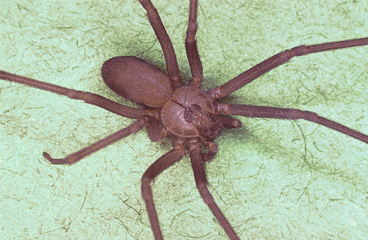
Overview
After being bitten by a brown recluse spider, you may have red skin and a blister where you were bitten. You may also have intense pain and itching around the bite. This may last a few hours.
In some cases, an open sore or black skin can appear around the bite. This can happen a week or more after you were bitten. This is a serious problem that needs medical attention.
Brown recluses are found most often in the south-central part of the United States. They live in hot, dry, abandoned areas, such as wood or rock piles. They can also be found indoors in dark closets, shoes, or attics.
Follow-up care is a key part of your treatment and safety. Be sure to make and go to all appointments, and call your doctor if you are having problems. It's also a good idea to know your test results and keep a list of the medicines you take.
How can you care for yourself at home?
- If the doctor gave you a prescription medicine for pain, take it as prescribed.
- If your doctor prescribed antibiotics, take them as directed. Do not stop taking them just because you feel better. You need to take the full course of antibiotics.
- Take an over-the-counter antihistamine, such as fexofenadine (Allegra) or loratadine (Claritin), to calm the itching and reduce the swelling. Read and follow all instructions on the label.
- Put ice or a cold pack on the bite for 10 to 20 minutes at a time. Put a thin cloth between the ice and your skin.
- If your doctor told you how to care for your wound, follow your doctor's instructions. If you did not get instructions, follow this general advice:
- Wash the bite area with clean water 2 times a day. Don't use hydrogen peroxide or alcohol, which can slow healing.
- You may cover the bite with a thin layer of petroleum jelly, such as Vaseline, and a nonstick bandage.
- Apply more petroleum jelly and replace the bandage as needed.
When should you call for help?
Call 911 anytime you think you may need emergency care. For example, call if:
- You passed out (lost consciousness).
- You have severe trouble breathing.
Call your doctor now or seek immediate medical care if:
- You get an open sore or black skin at the bite area.
- You are dizzy or lightheaded, or you feel like you may faint.
- You have new symptoms such as fever, vomiting, or a headache.
- You have symptoms of infection, such as:
- Increased pain, swelling, warmth, or redness.
- Red streaks leading from the area.
- Pus draining from the area.
- A fever.
Watch closely for changes in your health, and be sure to contact your doctor if:
- You have new or worse pain at the bite area.
- You do not get better as expected.
Where can you learn more?
Go to http://www.healthwise.net/patientEd
Enter Q971 in the search box to learn more about "Brown Recluse Spider Bite: Care Instructions".
Current as of: July 31, 2024
Author: Ignite Healthwise, LLC Staff
Clinical Review Board
All Ignite Healthwise, LLC education is reviewed by a team that includes physicians, nurses, advanced practitioners, registered dieticians, and other healthcare professionals.

